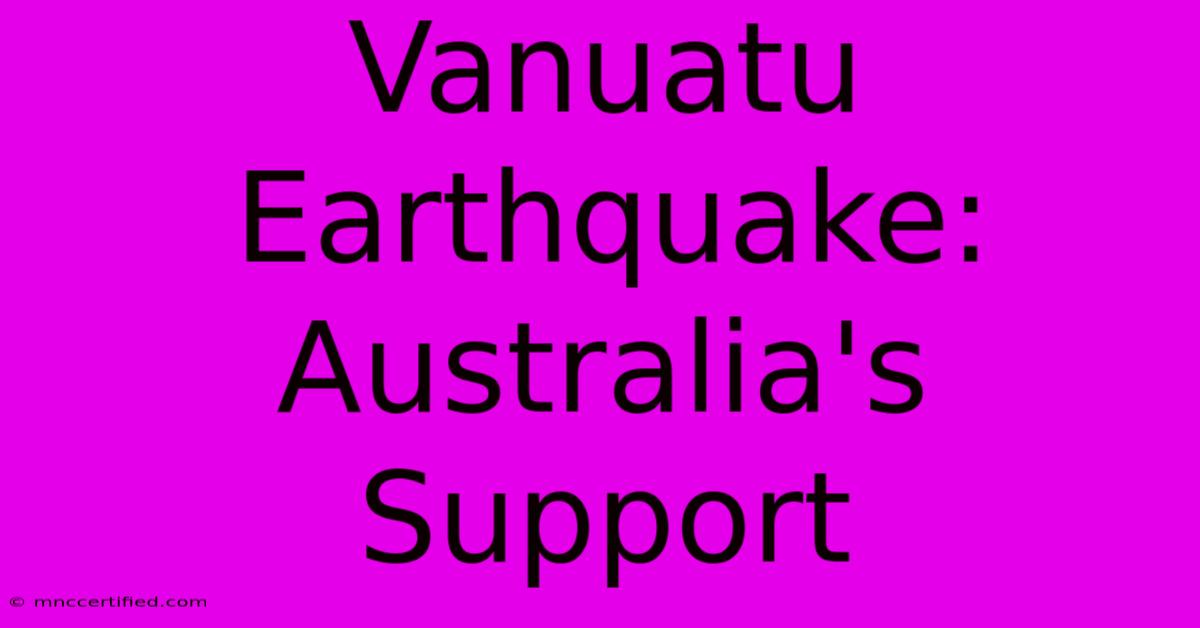Vanuatu Earthquake: Australia's Support

Table of Contents
Vanuatu Earthquake: Australia's Swift and Substantial Support
The recent earthquake that struck Vanuatu highlighted the nation's vulnerability to seismic activity and underscored the importance of international aid and disaster relief. Australia, a close neighbour and key partner, responded swiftly and significantly, offering crucial support to Vanuatu in its recovery efforts. This article details the nature and extent of Australia's contribution, examining the multifaceted response to this devastating natural disaster.
The Earthquake's Impact: A Devastating Blow to Vanuatu
Vanuatu, an archipelago nation in the South Pacific, sits within the "Ring of Fire," a highly seismically active zone. The earthquake, measuring [insert magnitude here], caused widespread damage, including [mention specific examples of damage: e.g., collapsed buildings, infrastructure damage, landslides]. This resulted in [mention casualties and displacement figures, if available]. The impact on already vulnerable communities was particularly severe, exacerbating existing challenges and creating an urgent need for humanitarian assistance.
Beyond the Immediate Aftermath: Long-Term Recovery Needs
The immediate aftermath required urgent attention to rescue operations, providing emergency medical care, and distributing essential supplies like food, water, and shelter. However, the challenges extend far beyond the initial crisis. The earthquake's long-term effects include:
- Infrastructure Repair: Rebuilding damaged roads, bridges, and other vital infrastructure is a crucial, long-term undertaking, demanding significant resources and expertise.
- Economic Recovery: The earthquake significantly disrupted Vanuatu's economy, affecting key sectors like tourism and agriculture. Economic recovery will require substantial investment and support.
- Psychological Support: The trauma experienced by survivors requires comprehensive psychological support and counseling services to aid in their recovery.
Australia's Response: A Multifaceted Approach
Australia responded rapidly and comprehensively to Vanuatu's plight, deploying a multi-faceted support package encompassing:
1. Immediate Disaster Relief: A Rapid Deployment Force
Australia quickly dispatched a Disaster Assistance Response Team (DART) to Vanuatu. This team, comprised of specialists in [mention specialties, e.g., search and rescue, medical assistance, engineering], provided critical on-the-ground support in the immediate aftermath of the earthquake. This rapid response was crucial in saving lives and mitigating further damage.
2. Financial Aid: Substantial Funding for Recovery
Australia committed a substantial amount of financial aid to support Vanuatu's recovery efforts. This funding is directed towards [mention specific areas of funding, e.g., emergency relief, infrastructure rebuilding, community recovery programs]. This financial assistance is vital in enabling the Vanuatu government to implement effective recovery strategies.
3. Logistical Support: Providing Essential Supplies
Australia provided significant logistical support, facilitating the transport of essential supplies, including [mention examples, e.g., medical equipment, shelter materials, food and water]. This logistical assistance ensured that aid reached those who needed it most efficiently.
4. Expertise and Training: Building Long-Term Resilience
Beyond immediate aid, Australia is also committed to supporting Vanuatu's long-term recovery. This includes providing technical expertise and training in areas such as [mention areas, e.g., disaster preparedness, infrastructure development, community resilience]. This focus on capacity building is essential for enabling Vanuatu to better withstand future natural disasters.
The Importance of International Collaboration
The Vanuatu earthquake underscores the vital role of international collaboration in responding to natural disasters. Australia's swift and substantial support demonstrates the strength of the bilateral relationship and the commitment to regional stability. This collaborative approach, involving multiple nations and organizations, is essential for effective disaster relief and long-term recovery.
Conclusion: A Testament to Regional Solidarity
Australia's response to the Vanuatu earthquake serves as a powerful example of international solidarity and the importance of preparedness and collaboration in the face of natural disasters. The multifaceted support, ranging from immediate disaster relief to long-term recovery assistance, demonstrates a commitment to supporting Vanuatu in its journey toward recovery and building greater resilience against future challenges. This unwavering support is not only crucial for Vanuatu's immediate needs but also for fostering stronger regional partnerships and promoting stability in the Pacific.

Thank you for visiting our website wich cover about Vanuatu Earthquake: Australia's Support. We hope the information provided has been useful to you. Feel free to contact us if you have any questions or need further assistance. See you next time and dont miss to bookmark.
Featured Posts
-
My Lfc Winter Wednesdays 500 Lfc Fashion
Dec 19, 2024
-
Perezs Red Bull Future 2025 Uncertain
Dec 19, 2024
-
Dennis Rodman Daughters Interview
Dec 19, 2024
-
Vick Norfolk Head Football Coach
Dec 19, 2024
-
Trinity Rodman Candid Dennis Interview
Dec 19, 2024